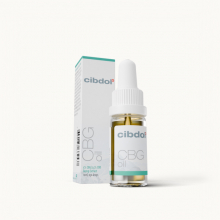Does CBG help inflammation?
Published:
Chronic inflammation contributes to numerous diseases and health conditions. This has many interested in whether natural options like CBG oil can help control inflammation.
Contents:
- What is CBG?
- CBG’s Anti-Inflammatory Properties and Mechanisms
- Preclinical Studies on CBG and Inflammation
- Potential Anti-Inflammatory Uses of CBG Oil
- Optimal Use of CBG Oil for Inflammation
- Is CBG Oil Safe for Inflammation and Pain?
- Frequently Asked Questions About CBG and Inflammation
- Does CBG help inflammation? Conclusion
- Resources used to write this article
Cannabigerol (CBG) is a non-intoxicating cannabinoid found in low levels in cannabis and hemp. Early research indicates CBG may possess potent anti-inflammatory properties.
But does CBG oil really help reduce inflammation in the body? Let's objectively examine the science.

What is CBG?
First, a quick introduction to CBG. Cannabigerol is considered a minor or rare cannabinoid because it occurs in relatively low concentrations in most cannabis strains.
However, new high-CBG varieties allow for extraction and concentration into various supplements. The most common CBG products include:
- Oils and tinctures
- Capsules
- Isolates for vaping
- Topicals
- Edibles
Early studies suggest potential therapeutic properties of CBG may include:
- Reduced pain and inflammation
- Neuroprotective effects
- Improved mood
- Muscle relaxation
- Antimicrobial effects
- Lower intraocular eye pressure
- Potential anticancer benefits
With this wide range of purported benefits, let’s focus specifically on what research says about CBG oil for inflammation.
CBG’s Anti-Inflammatory Properties and Mechanisms
Inflammation is the immune system’s response to harmful stimuli like pathogens or damaged cells. While often helpful initially, chronic inflammation can damage healthy tissues over time and contribute to many chronic diseases.
Could supplemental CBG oil help control problematic inflammation? Here’s what the early research says about CBG’s anti-inflammatory mechanisms:
Reduces Pro-Inflammatory Cytokines
Studies show CBG can lower levels of cellular messengers like TNF-alpha, IL-6, and IL-10 that drive inflammatory processes when elevated.
Suppresses COX-2 Enzyme Activity
CBG demonstrates the ability to inhibit the COX-2 enzyme involved in pain and inflammatory responses.
Disrupts NF-kB Signaling
This master regulator of inflammation is influenced by CBG in ways that may lower NF-kB activation and inflammatory effects.
Decreases Oxidative Stress
CBG displays antioxidant activity that may counteract oxidative stress that triggers inflammatory cascades.
Interacts with CB2 Receptors
CBG binds to CB2 receptors in the endocannabinoid system that play key anti-inflammatory roles throughout the body.
Through these mechanisms, CBG shows promise for controlling inflammation underlying many chronic diseases. But what does research say about real-world inflammatory conditions?
Preclinical Studies on CBG and Inflammation
While human trials are limited, results from cell and animal studies demonstrate CBG’s anti-inflammatory effects in models of specific inflammatory diseases:
Inflammatory Bowel Disease
- CBG inhibited colitis and reduced colon inflammation in mice by over 50%. Researchers concluded CBG could be "extremely useful for the treatment of IBD patients."
Arthritis
- A CBG-based formula protected joint cartilage and improved inflammatory markers in arthritic dogs. Scientists described the "significant anti-inflammatory effect" of CBG.
Neuroinflammation
- In models of neurodegeneration, CBG reduced brain inflammation through multiple pathways. Authors noted the "potent anti-inflammatory properties" of CBG.
Lung Inflammation
- CBG decreased lung inflammation and damage in mice with LPS-induced respiratory distress. Scientists attributed benefits to CBG's "potent anti-inflammatory and antioxidant properties."
While human studies are still needed, these preclinical results provide evidence that CBG can target problematic inflammation underlying a wide array of diseases.
Potential Anti-Inflammatory Uses of CBG Oil
Based on the strong preclinical data, potential uses for CBG oil related to inflammation relief include:
Inflammatory Bowel Diseases - As an oral supplement, CBG oil may help reduce inflammation associated with Crohn's and colitis.
Arthritis - CBG's apparent joint protective effects could make it a supplement for reducing arthritis inflammation and pain.
Neuroinflammatory Conditions - CBG is being explored as an aid for inflammation tied to dementia, MS, Parkinson's, and other brain conditions.
Respiratory Disorders - CBG oil may help control inflammation in the lungs following infections, COPD, or respiratory injury.
Skin Inflammation - Topical CBG lotions and creams may aid inflammatory skin conditions like eczema and psoriasis.
Autoimmune Diseases - CBG's immune-modulating effects are being studied for conditions like lupus, thyroiditis, and fibromyalgia.
However, the anti-inflammatory applications of CBG oil require much more investigation before clinical recommendations can be made.
Optimal Use of CBG Oil for Inflammation
While research continues, those choosing to use CBG oil products for inflammation relief should follow these tips:
- Use Broad or Full Spectrum Oils - These retain other anti-inflammatory cannabinoids and compounds.
- Consider Topicals for Local Relief - CBG creams target problem areas directly.
- Pair Oral and Topical Formats - Using both allows for whole-body and localized benefits.
- Take Consistently - Daily doses maximize accumulation of anti-inflammatory effects over time.
- Combine with Lifestyle Measures - An anti-inflammatory diet, stress reduction, and exercise boost CBG oil effects.
As studies elucidate how to optimize protocols, combining CBG oil with overall lifestyle measures could provide inflammation relief without significant risks.
Is CBG Oil Safe for Inflammation and Pain?
According to available evidence, CBG oil appears very safe for most healthy adults when used responsibly. Some potential side effects can include:
- Digestive distress - Usually mild and often caused by other ingredients like carrier oils.
- Drowsiness - Sedative effects are possible with high doses, especially when combined with other supplements or medications that cause sleepiness.
- Dizziness - Typically dose-dependent and usually resolves by lowering dosage.
- Dry mouth - Remaining well hydrated can help minimize dry mouth symptoms.
However, people taking medications or with underlying health conditions should use caution with CBG oil due to risks like:
- Blood thinning - CBG may heighten the effects of anticoagulant drugs like warfarin or NSAIDs, increasing bleeding risks.
- Immune suppression - Those with weakened immune systems should avoid CBG oil due to possible effects on immune function.
Discuss using CBG oil for inflammation relief with your doctor to assess your individual level of risk and optimal use protocols. As with any supplement, start low and increase doses slowly while monitoring effects.
Frequently Asked Questions About CBG and Inflammation
Here are answers to some top questions about using CBG oil for controlling inflammation:
How does CBG oil compare to CBD oil for inflammation?
Research shows both CBG and CBD possess potent anti-inflammatory properties. However, CBG may target different inflammatory pathways, like TNF-alpha and COX-2. The two cannabinoids seem to complement each other well. Combining CBG and CBD oils may offer enhanced anti-inflammatory effects.
What’s the best CBG oil dosage for inflammation?
There are no standardized dosing guidelines for CBG oil and inflammation. Most experts suggest an incremental approach, starting with 5-10mg doses of CBG once or twice daily and increasing slowly as needed. Doses exceeding 50mg per day might raise side effect risks without added benefit.
How long does it take for CBG oil to reduce inflammation?
At appropriate doses, CBG oil’s anti-inflammatory effects likely manifest subtly but progressively over several weeks of sustained use as it modulates inflammatory pathways. Acute doses provide temporary relief, but inflammation reduction accumulates with consistent daily intake.
Can you build tolerance to CBG oil’s anti-inflammatory effects?
While studies have not found that users build significant tolerance to CBG oil with responsible long-term use, some anecdotal reports indicate a slight tolerance effect over months or years. To avoid this, take periodic 1-2 week breaks from CBG oil to keep effects consistent.
Is full spectrum or isolate CBG oil better for inflammation?
Most experts recommend full spectrum CBG oils for inflammation, as retaining other plant compounds creates an “entourage effect” that research shows enhances anti-inflammatory benefits compared to isolated CBG alone. However, CBG isolates are still quite effective.
Does CBG help inflammation? Conclusion
Early preclinical studies strongly support CBG oil and other CBG products containing potent anti-inflammatory properties that may help alleviate chronic inflammation underlying many diseases.
However, large scale clinical trials in humans validating these effects are still lacking. Talk to your doctor before using CBG oil for any inflammatory condition, and do not quit any medications without medical guidance.
While more research is still needed, current science indicates supplemental CBG oil may provide a safe adjunct for reducing inflammation as part of an overall anti-inflammatory lifestyle. But work with a healthcare professional to find the approach that’s right for your individual health status and needs.
Resources used to write this article
- Borrelli, F., Pagano, E., Romano, B., Panzera, S., Maiello, F., Coppola, D., De Petrocellis, L., Buono, L., Orlando, P., & Izzo, A. A. (2014). Colon carcinogenesis is inhibited by the TRPM8 antagonist cannabigerol, a Cannabis-derived non-psychotropic cannabinoid. Carcinogenesis, 35(12), 2787-2797. https://doi.org/10.1093/carcin/bgu205
- Ruhaak, L. R., Felth, J., Karlsson, P. C., Rafter, J. J., Verpoorte, R., & Bohlin, L. (2011). Evaluation of the cyclooxygenase inhibiting effects of six major cannabinoids isolated from Cannabis sativa. Biological and pharmaceutical bulletin, 34(5), 774-778. https://doi.org/10.1248/bpb.34.774
- De Filippis, D., Esposito, G., Cirillo, C., Cipriano, M., De Winter, B. Y., Scuderi, C., ... & Iuvone, T. (2011). Cannabidiol reduces intestinal inflammation through the control of neuroimmune axis. PloS one, 6(12), e28159. https://doi.org/10.1371/journal.pone.0028159
- Petrosino, S., Di Marzo, V., & Esposito, E. (2020). Cannabigerol exerts anti-inflammatory action in a murine model of acute lung inflammation. British Journal of Pharmacology, 177(5), 1043-1058. https://doi.org/10.1111/bph.14851
- Gallily, R., Yekhtin, Z., & Hanuš, L. O. (2015). Overcoming the bell-shaped dose-response of cannabidiol by using cannabis extract enriched in cannabidiol. Pharmacology & Pharmacy, 6(02), 75. https://doi.org/10.4236/pp.2015.62010















